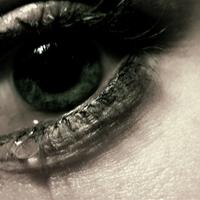
May 8, 2013
One question that listeners keep shooting our way is why do humans cry? Be it something stuck in our eye, a surge of love, a great joke, a death, or just a crappy Tuesday -- we cry a lot (and when we don’t, the lack of tears is very noticed).
“Tears are really the only bodily fluid that doesn’t offend others,” says Michael Trimble, who we rang up to get the dirty deets on our tear ducts. Trimble is Emeritus Professor in behavioral neurology at the Institute of Neurology, London. He recently wrote a book called Why Humans Like to Cry. What follows is an excerpt of our conversation with Trimble.
RL: What is happening physically when I cry?
MT: If you ask people what’s the opposite of crying they’ll say laughing. The emotion [that comes] with both laughing and crying leads to it being hard to speak -- you get choked. But they are different. Crying begins in the guts; it’s a gut feeling that rises upwards. It starts with heavy breathing, your throat becomes dry, and the muscles around the eye contract. This then triggers a reflex from the central nervous system back to the lachrymal glands with an increased output of tears. You often can’t prevent it. Laughing on the other hand is quite evanescent. And there doesn’t have to be a joke to laugh. For example, “Fred, how are you? Haha,” is used often as a greeting. But crying is usually not a greeting communication.
That would be a pretty weird way to say hello… in your book, you talk about how humans are the only animals that cry, at pretty much everything. Why do we do it?
Tears have a biological function to make the eye moist. Tears contain proteins and antibiotics to keep the eyes from getting infected. Conjunctivitis, when the eye becomes infected and red, will lead to tears because of the irritation of the eye. If you throw grit into the eye of any animal that has an eye it needs to be kept moist, it will cause tears. But I want to emphasize this: only human beings cry emotionally (but I am not saying that animals don’t have emotions or do not mourn).
Wow, that’s crazy – why are humans the only animals that emotionally cry?
We have no idea precisely. But my [idea] is that when small social communities began to develop language, this allowed for the development of self-consciousness. To be self-conscious, you need the “I,” and to have “I” you need to realize it is “here and now.” With this development, people began to understand that others in their small community died and disappeared. [They began to try to connect to those who were gone, and] this is when early religious ceremonies developed which involved singing and dancing. I believe that this is when crying developed as an emotional signal. Group crying may have been an important aspect of these ceremonies and is still an important feature of religious services today. Over a long period of time my speculation is that the early development of emotional tears happened with bereavement.
Another explanation -- again we can’t prove this -- is that in these early ceremonies, cremation occurred. People were gathered around the fire and that provoked tears through irritation. And then being sad became linked with tears.
But if that was the case, wouldn’t we cry only at funerals? But we’ll cry at pretty much any emotion…
Well, it’s linked to loss and detachment. The most important things to mammals are mothers. If the mammal infant does not cry out, it will die. The separation call is the first thing that happens; it’s the beginning of bonding a baby to a mother. In my opinion, this is why we generally feel better after crying -- because it’s an emotional response learned early on. And this developed between one million and 200,000 years ago, [though] we can’t be very exact.
So you’re saying that crying makes us feel better because it reminds us of being comforted by our mothers, but then I saw some studies arguing just the opposite. Is crying really good for us? Most people generally say it makes them feel better.
The majority of studies indicate that people feel better after crying. It’s situation specific -- obviously if you have a domestic argument and it continues, you won’t feel any better. But with music, poetry, bereavement… you feel better. In fact, crying is [often socially] expected. Shakespeare had a great quote about this:
And if the boy have not a woman’s gift
To rain a shower of commanded tears,
An onion will do well for such a shift.
Are you saying that Shakespeare was all about shoving an onion up our sleeves to make us cry when necessary?
What it comes back to is catharsis, an Aristotelian idea, which goes back to the theater of tragedy. Tragedy, particularly if combined with music (for example opera or the movies) leads to an emotional response which is positive, interlinked with this is very often crying. [Under the right circumstances,] the sensation of feeling better is prolonged with crying. When you laugh, the feelings are very often over as soon as the laughing bout ceases. If you go to an opera and cry at the death of Mimi [in La Boheme], your calmness lasts much longer.